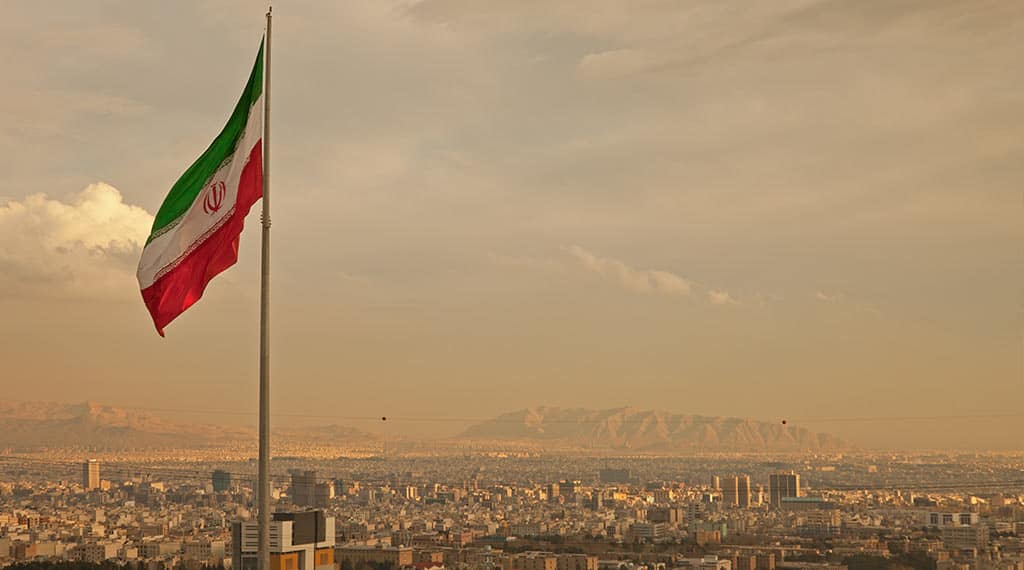
A man whose social media was filled with Pro-Iranian regime materials stabbed author Salman Rushdie at least ten times Friday, while the author of The Satanic Verses was speaking at the Chautauqua Institution in western New York. Rushdie was rushed to the hospital after the attack where he has recently been taken off a ventilator but will continue to suffer from what were described as ‘life changing’ injuries. The question that everyone is asking seems obvious: Was Iran directly involved?
What We Know
The Iranian regime placed a fatwa authorizing Rushdie’s murder in 1989, along with a bounty of millions of dollars. Additionally, various news outlets have reported that Rushdie’s attacker may have had direct ties with Iran’s Islamic Revolutionary Guards Corp (IRGC).
Authorities charged alleged would-be assassin 24-year-old Hadi Matar with the attempted murder. Matar reportedly was in “direct contact with members of the IRGC on social media,” according to European and Middle Eastern intelligence. A VICE report noted that “It’s unclear the extent of the involvement (of the IRGC) – if this was a directly supported assassination attempt or if it was a series of suggestions and directions in picking a target.” Evidence has not been uncovered directly linking the Iranian regime to the assassination attempt. However, in addition to the ongoing fatwa on Rushdie’s head, a series of recent events outlines concerning connections.
Matar is an American-born U.S. National of Lebanese descent. His parents emigrated from Yaroun in South Lebanon, an area known for the strong influence of Hezbollah. According to Matar’s mother, the suspect returned from a 2018 trip to Lebanon as a “religious zealot” who was moody and withdrawn.
Friday’s attempted assassination of Rushdie follows a string of Iranian-state-sponsored terrorist activities on U.S. soil. Last week, an Iranian IRGC member was charged with plotting to kill former National Security Advisor John Bolton. A few days prior, an Iranian agent was arrested by the FBI outside the home of Iranian-American activist Masih Alinejad. This recent incident occurred one year after three Iranian agents were charged by federal prosecutors in New York for attempting to kidnap Alinejad and forcibly bring her to Iran, which she fled from more than a decade earlier. While these three instances represent the most recent malign activity orchestrated by the regime, many more instances of Iranian-directed abduction and murder ploys have played out over the years.
Rushdie is a British and American national of Indian descent, who emerged as a controversial figure for his portrayal of Islam. The Satanic Verses was published in 1988, sparking mass protests across the globe. The book, considered to be blasphemous by many Muslims, remains banned in several countries, including the United Arab Emirates (UAE) and Egypt.
A few months after the publication of “Satanic Verses,” Rushdie commented on the demonstrations that ensued in an opinion piece for The New York Review:
“One may not discuss Muhammad as if he were human, with human virtues and weaknesses. One may not discuss the growth of Islam as a historical phenomenon, as an ideology born out of its time. These are the taboos against which The Satanic Verses has transgressed (these and one other; I also tried to write about the place of women in Islamic society, and in the Koran). It is for this breach of taboo that the novel is being anathematized, fulminated against, and set alight.”
Iran’s then-Supreme Leader Ayatollah Ruhollah Khomeini issued a fatwa against Rushdie urging “Muslims of the world rapidly to execute the author and the publishers of the book” so that “no one will any longer dare to offend the sacred values of Islam.” A bounty of $2.8 million was placed on Rushdie, forcing him into hiding for nearly 13 years. Iran directly supported an assassination attempt against Rushdie until 1998, when the country’s new president Mohammed Khatami said the regime would neither “support nor hinder” the author’s killing as a condition for reestablishing diplomatic ties with the United Kingdom. Yet an official withdrawal of the original fatwa has never been issued by the regime, and on the 30th anniversary of the fatwa, Supreme Leader Ayatollah Ali Khamenei tweeted that “Imam Khomeini’s verdict regarding Salman Rushdie is based on divine verses and just like divine verses, it is solid and irrevocable.” Twitter removed the post and suspended Khamenei’s account.
While there is not yet direct evidence of IRGC involvement in the Rushdie assassination attempt, given other examples of Iranian-inspired or controlled plots in recent weeks it is reasonable to presume that this is another example of increasingly aggressive Iranian behavior. The White House should halt ongoing joint U.S.-Iranian nuclear negotiations in Vienna as long as the Iranians continue to perpetrate these kinds of terrorist acts on U.S. soil.
- Iran’s Growing Missile Arsenal Is a Challenge for Israel - November 18, 2025
- IAI Is Hoping to Secure a Contract for the “Golden Dome” - November 3, 2025
- Trump dispatches B-1 bombers and other military assets to Venezuela - October 28, 2025
